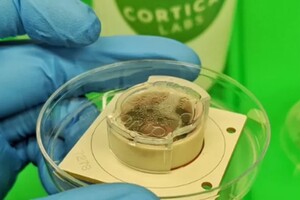According to the researchers, the “brain” senses the environment and reacts to it.

Dr. Brett Kagan from the company Cortical Labs stated about that he succeeded in creating the first “intelligent brain” grown in a laboratory. He claims that the created “mini brain” can sense the environment and react to it, reports the BBC.
Other experts call the work fascinating, but say that it is too early to call brain cells intelligent.
« We couldn't find the best term to describe the device. It is able to receive information from an external source, process it and react to it in real time,” Kagan said.
Also read: A dangerous fungus has learned to change its shape to penetrate deep into the brain
For the first time, “mini-brains” were grown in the laboratory in 2013 to study microcephaly, a genetic disease in which the brain is too small. Since then, they have been used to study brain development. Now, for the first time, such minibrains were able to interact with the environment – the 1970s video game Pong.
For this, scientists grew 800 thousand human brain cells from stem cells and some from mouse cells. The researchers then “wired” this mini-brain into a video game using electrodes that showed which side and how far the ball was.
In response, the cells produced their own electrical activity. During the game, they produced less energy. But when the ball passed the platform and the game started again, with the ball at a random point, they used more energy to adjust to the new contingency.
Minibrain learned to play in five minutes. He often missed the ball, but his success was much higher than a random result. However, scientists stress that the brain has no consciousness, so it doesn't realize it's playing a game the way a human player does.
Kagan hopes that in the future such mini-brains can be used for testing drugs for neurodegenerative diseases such as Alzheimer's disease. In the future, he intends to test the effect of alcohol on the brain's ability to play the game.
Related video
Previously, scientists from Great Britain announced the creation of a “synthetic” mouse embryo without an egg or sperm. The embryos were created from stem cells and were able to start developing a brain, heart and other organs within a week.




